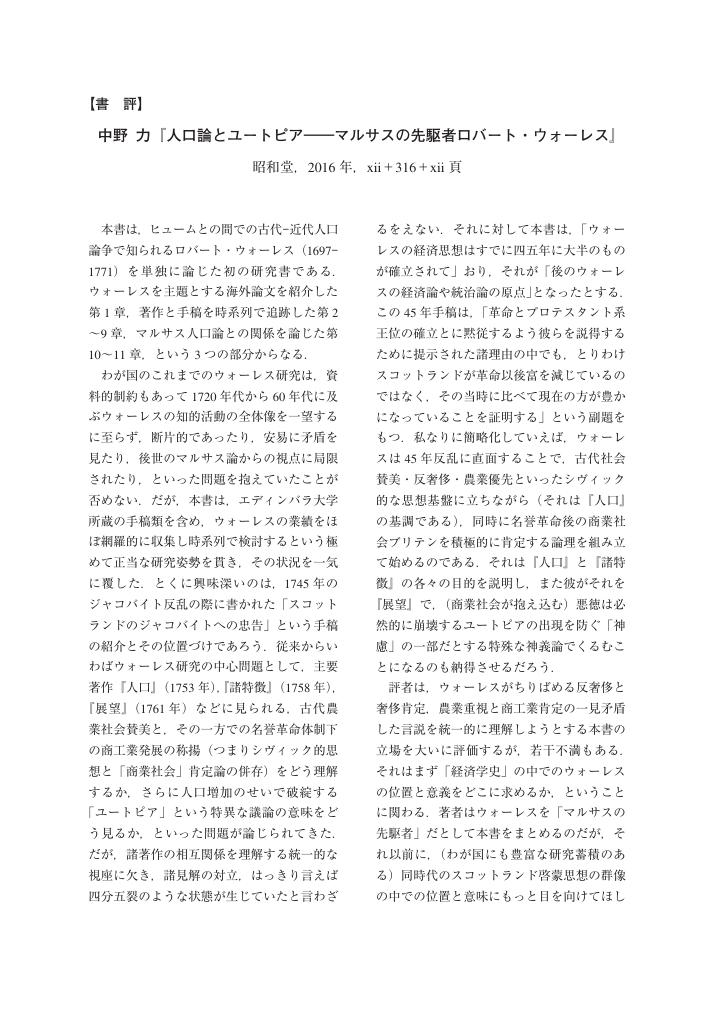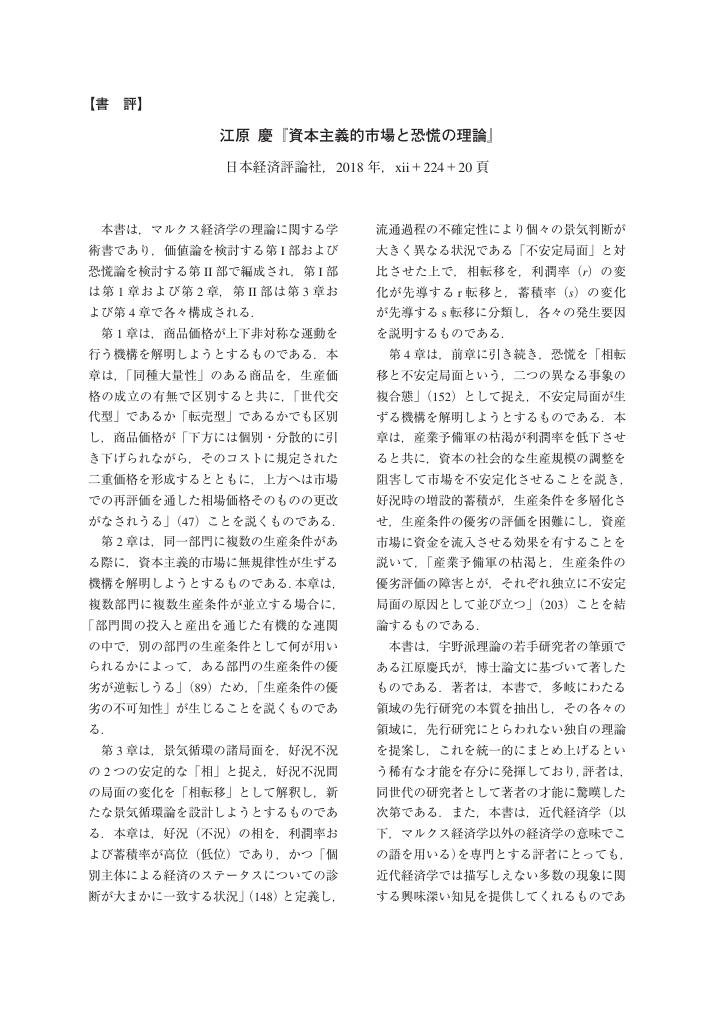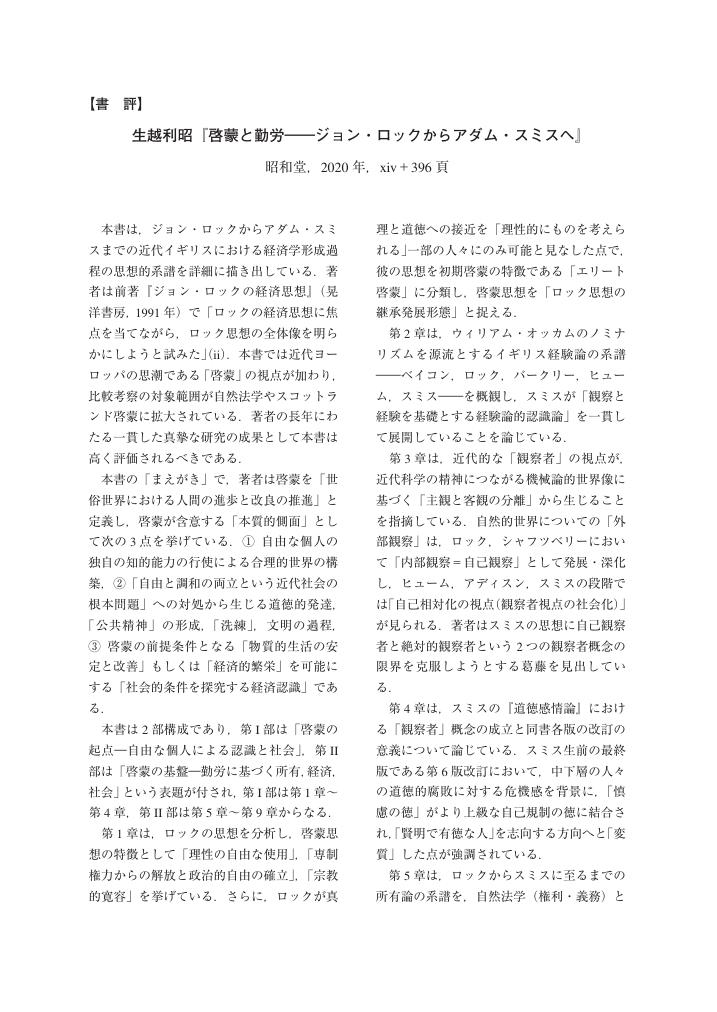2 0 0 0 OA 小林昇『最初の経済学体系』, 名古屋大学出版会, 1994, v+180+3p.
- 著者
- 渡辺 邦博
- 出版者
- 経済学史学会
- 雑誌
- 経済学史学会年報 (ISSN:04534786)
- 巻号頁・発行日
- vol.33, no.33, pp.187, 1995 (Released:2010-08-05)
- 著者
- 田中 正司
- 出版者
- 経済学史学会
- 雑誌
- 経済学史学会年報 (ISSN:04534786)
- 巻号頁・発行日
- vol.30, no.30, pp.115, 1992 (Released:2010-08-05)
2 0 0 0 モラル・エコノミーとポリティカル・エコノミー
- 著者
- 音無 通宏
- 出版者
- 経済学史学会
- 雑誌
- 経済学史学会年報 (ISSN:04534786)
- 巻号頁・発行日
- vol.36, no.36, pp.26-39, 1998
Economics today is confronted with great difficulties as it attempts to theoretically treat environmental concerns and many other serious problems. This situation, in my view, has been brought about partly by the way of thinking that confines economics largely to the analysis of the price mechanisms of goods in so far as they find their way into the market. On the contrary, the conception of “moral economy” as formulated by E. P. Thompson recognises that many important facets of the life of people in a society exist outside the market. Through research into historical sources of the food riots in eighteenth century England, he found that there existed a traditional and customary right to subsistence among the labouring poor. These poor repeatedly rioted against increases in corn and bread prices in times of dearth, selling them at prices they set themselves. In light of this history, Thompson severely criticised Adam Smith's theory of free trade in the corn market as victimizing the labouring poor, and hence he criticised Smith's political economy as a whole. However, despite his correctness in emphasising the necessity for remedies to scarcity among the poor, he seems to have misunderstood the character and nature of political economy in general. Political economy from Smith to J. S. Mill and economics even after the 1870s sought to remedy the poverty of the labouring poor as a subject and to reconcile their rights to subsistence with the right of property.
- 著者
- 小室 正紀
- 出版者
- 経済学史学会
- 雑誌
- 経済学史研究 (ISSN:18803164)
- 巻号頁・発行日
- vol.47, no.2, pp.152-153, 2005-12-24 (Released:2010-08-05)
2 0 0 0 ゲーム理論の歴史と現在--人間行動の解明を目指して
- 著者
- 岡田 章
- 出版者
- 経済学史学会
- 雑誌
- 経済学史研究 (ISSN:18803164)
- 巻号頁・発行日
- vol.49, no.1, pp.137-154, 2007-06
This paper considers the history of game theory since von Neumann and Morgenstern published their monumental work The Theory of Games and Economic Behavior in 1944. It points out changes in research themes and discusses what game theory has achieved up to the present. The aim of von Neumann and Morgenstern was "to find the mathematically complete principles which define rational behavior for the participants in a social economy, and to derive from them the general characteristics of that behavior." Extending the theory of von Neumann and Morgenstern, Nash classified all games as either non-cooperative games or cooperative games and defined the notion of an equilibrium point for a non-cooperative game. Nash also suggested a research program, now called the Nash program, to analyze a coop erative game by constructing a non-cooperative game model for negotiations. The main field of game theory was cooperative games in the l950s and the 1960s. Thereafter, research trends in game theory in the 1970s and the 1980s shifted from cooperative games to non-cooperative games, led by the seminal works of Harsanyi on incomplete information games and Selten on perfect equilibrium in extensive games. This so-called non-cooperative revolution greatly promoted applications of non-cooperative game theory to economics. At the same time, researchers became increasingly dissatisfied with the strong assumption of rationality in traditional game theory, and consequently research interest turned toward two new fields in the 1990s. One is evolutionary game theory, developing out of evolutionary biology, and the other is behavioral game theory, which collaborates with psychology. Evolutionary game theory investigates dynamic processes of evolution and learning in economic behavior, and it reformulates game equilibrium as a stable stationary state of those dynamic processes. Behavioral game theory studies the structures of motivation, cognition, and reasoning in human decision-making using the methodology of experiments. This paper shows how present-day research in game theory is developing in divergent fields that consider both traditional theory based on unbounded rationality and behavioral theory exploring human bounded rationality. Game theory continues to be one of the most active research fields in economics.
2 0 0 0 OA ハイエクとシカゴ学派 : 方法論と自由主義
- 著者
- 江頭 進
- 出版者
- 経済学史学会
- 雑誌
- 経済学史研究 (ISSN:18803164)
- 巻号頁・発行日
- vol.53, no.2, pp.41-58, 2012-01-25
This paper aims to consider how the Chicago school of economics influenced the economic thought of Friedrich Hayek in his period at the University of Chicago, where he was a follower of the Committee of Social Thought from 1950 to 1962. This period is well known as "Hayek's transformation"-from a theoretical economist to a thinker of liberalism. Therefore, to understand the development of his thought, it is important to know who influenced him during this period. This paper will explore the relationship between Hayek and the members of the Committee of Social Thought, by analyzing his works, correspondence, and typescripts written during this period. On the one hand, the similarities and differences between Hayek's liberalism and that of the Chicago school are pointed out. Hayek and several economists of the Chicago school were members of the Mont Pelerin Society and were anti-communists. Despite the tendency to place both Hayek and the Chicago school under the general banner of anti-socialism or anti-Keynesianism, they actually diverged widely on points of methodology and liberalism. However, it is an inevitable consequence that different methodologies produce different economics, and the forms of liberalism based on these economics also differ.
- 著者
- 寺尾 範野
- 出版者
- 経済学史学会
- 雑誌
- 経済学史研究 (ISSN:18803164)
- 巻号頁・発行日
- vol.54, no.2, pp.45-61, 2013-01
- 著者
- 瀬尾 崇
- 出版者
- 経済学史学会
- 雑誌
- 経済学史研究 (ISSN:18803164)
- 巻号頁・発行日
- vol.63, no.1, pp.74-75, 2021 (Released:2022-01-13)
- 著者
- 岩本 吉弘
- 出版者
- 経済学史学会
- 雑誌
- 経済学史研究 (ISSN:18803164)
- 巻号頁・発行日
- vol.63, no.1, pp.76-77, 2021 (Released:2022-01-13)
1 0 0 0 OA 服部正治『穀物の経済思想史』 知泉書館,2017 年
- 著者
- 長峰 章
- 出版者
- 経済学史学会
- 雑誌
- 経済学史研究 (ISSN:18803164)
- 巻号頁・発行日
- vol.63, no.1, pp.78-79, 2021 (Released:2022-01-13)
- 著者
- 田村 信一
- 出版者
- 経済学史学会
- 雑誌
- 経済学史研究 (ISSN:18803164)
- 巻号頁・発行日
- vol.63, no.1, pp.80-81, 2021 (Released:2022-01-13)
- 著者
- 南森 茂太
- 出版者
- 経済学史学会
- 雑誌
- 経済学史研究 (ISSN:18803164)
- 巻号頁・発行日
- vol.63, no.1, pp.82-83, 2021 (Released:2022-01-13)
1 0 0 0 OA 一樂照雄の社会経済思想と日本の有機農産物「産消提携」運動
- 著者
- 根本 志保子
- 出版者
- 経済学史学会
- 雑誌
- 経済学史研究 (ISSN:18803164)
- 巻号頁・発行日
- vol.63, no.1, pp.1-22, 2021 (Released:2022-01-13)
This paper examined Teruo Ichiraku's(1906―1994)thoughts on co-operative societies and the economic aspects of his 'Ten Principles of teikei' formulated in 1978. Ichiraku held high-ranking positions in several co-operative organisations and founded the Japan Organic Agriculture Association in 1971. He was influenced by pre-Second World War Japanese cooperativism and peasantism. He found his co-operative ideal in the teikei system started by organic farmers and consumer groups, some of which were organised by Yoneo Okada, and supported it as an alternative to the capitalist market systems dominated by monetary values. The teikei system involves a direct partnership between producers and consumers, eliminating commercial distributions and building reciprocal face-to-face relationships. According to Ichiraku, Japanese agriculture was unjustly pulled into exchange economies by industrial policies after the Meiji Restoration. He argued that the agriculture sector should have the same footing as other sectors, and that agricultural products should not be commodities for anonymous individuals in the market for three reasons: food is a necessity; Japanese agriculture is practised by small families; and it doesn't allow farmers to determine the price, because the distribution processes are controlled by the commercial capitals. However, a personal relationship with partners enables the evaluation of agricultural products in use-value, independence from the price-determining features of commercial markets, and a 'no-lying' relationship with respect to the pricing and the use of pesticides and other harmful chemicals. Ichiraku encouraged 'a face-to-face sympathy based on humanity,' which underlay the 'Ten Principles of teikei,' to control human greed within the framework of mutual assistance ― the requirement for realising 'a fair society.' Compared with Japanese peasantism, teikei's uniqueness is that it stimulated consumers to buy and support agricultural products based on mutual understanding and reciprocity.
1 0 0 0 OA 江原 慶『資本主義的市場と恐慌の理論』 日本経済評論社,2018 年
- 著者
- 村上 弘毅
- 出版者
- 経済学史学会
- 雑誌
- 経済学史研究 (ISSN:18803164)
- 巻号頁・発行日
- vol.63, no.1, pp.68-69, 2021 (Released:2022-01-13)
1 0 0 0 OA 生越利昭『啓蒙と勤労─ジョン・ロックからアダム・スミスへ』 昭和堂,2020 年
- 著者
- 門 亜樹子
- 出版者
- 経済学史学会
- 雑誌
- 経済学史研究 (ISSN:18803164)
- 巻号頁・発行日
- vol.63, no.1, pp.70-71, 2021 (Released:2022-01-13)
- 著者
- 清水 真志
- 出版者
- 経済学史学会
- 雑誌
- 経済学史研究 (ISSN:18803164)
- 巻号頁・発行日
- vol.63, no.1, pp.72-73, 2021 (Released:2022-01-13)
- 著者
- 今井 祐之
- 出版者
- 経済学史学会
- 雑誌
- 経済学史研究 (ISSN:18803164)
- 巻号頁・発行日
- vol.62, no.2, pp.94-95, 2020 (Released:2021-12-19)
- 著者
- 楠木 敦
- 出版者
- 経済学史学会
- 雑誌
- 経済学史研究 (ISSN:18803164)
- 巻号頁・発行日
- vol.62, no.2, pp.96-97, 2020 (Released:2021-12-19)
1 0 0 0 OA 斎藤幸平『大洪水の前に―マルクスと惑星の物質代謝』堀之内出版,2019 年
- 著者
- 伊藤 誠
- 出版者
- 経済学史学会
- 雑誌
- 経済学史研究 (ISSN:18803164)
- 巻号頁・発行日
- vol.62, no.2, pp.98-99, 2020 (Released:2021-12-19)
- 被引用文献数
- 1
- 著者
- 佐々木 憲介
- 出版者
- 経済学史学会
- 雑誌
- 経済学史研究 (ISSN:18803164)
- 巻号頁・発行日
- vol.62, no.2, pp.100-101, 2020 (Released:2021-12-19)















